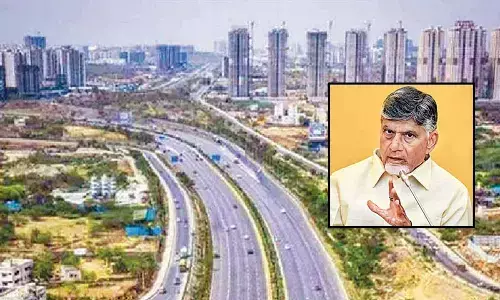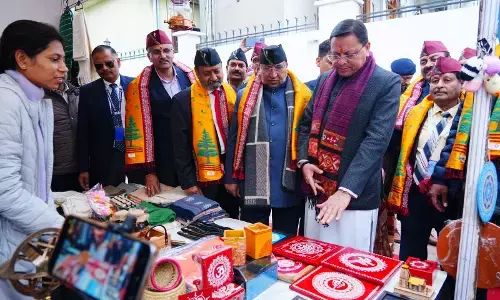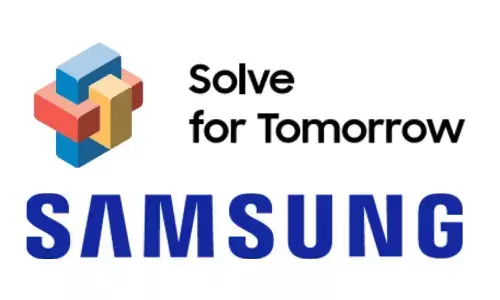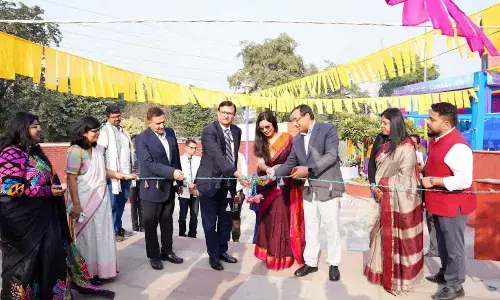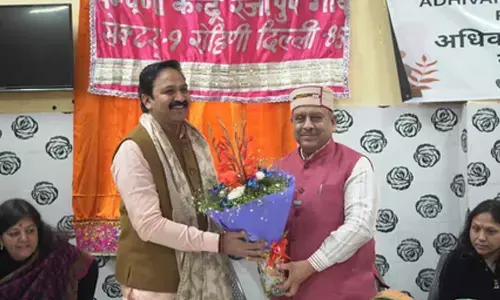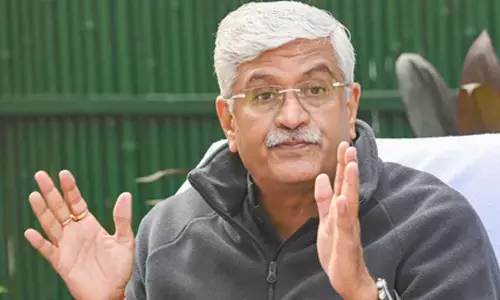Today is National Science Day: Virasat of Vigyan, with Vision of Vikas
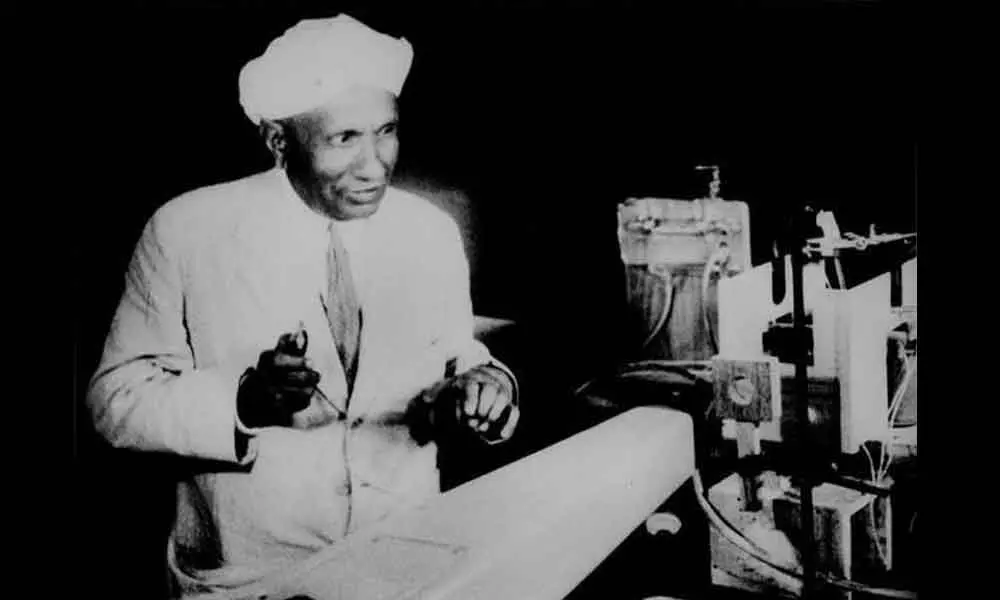
Physicist C V Raman
National Science Day is celebrated in India on 28 February every year to mark the discovery of the Raman Effect by physicist Sir C V Raman on February 28, 1928. For his discovery, he won the Nobel Prize in Physics in 1930. In 1954, the country honoured him with the highest civilian award of Bharat Ratna
New Delhi: India celebrates National Science Day on February 28 annually to commemorate the discovery of the Raman Effect by the Nobel Laureate, Physicist C V Raman on this day in 1928.
Chandrashekhara Venkata Raman, hailing from the State of Tamil Nadu, was a physicist. His work in the field of light scattering, which is known as Raman Effect, was honoured with the Nobel Prize for Physics in 1930. In 1954, the country honoured him with the highest civilian award of Bharat Ratna.
Since 1999, the theme has been given annually to focus on the celebration. This year, the theme of National Science Day 2022 is 'Integrated Approach in Science and Technology for a Sustainable Future.' The theme focuses on a four-fold integrated approach, which will direct the country to work in a global arena.
The four-fold approach consists of integration of all the scientific departments which can work on a theme-based approach; extended scientific integration, encompassing engineering; medical and other institutions.
Prime Minister Narendra Modi has given the vision of extended science driven with inclusive approach by integrating startups and industry. For instance, the National Multimodal Connectivity Project, called PM Gati Shakti, aims to bring in 16 ministries together for integrated planning and coordinated implementation of infrastructure connectivity projects. The digital platform will provide seamless affinity and facilitate the last-mile connectivity of infrastructure and reduce travel time.
The country is celebrating National Science Week with the title 'Vigyan Sarvatra Pujyate' (Science and Technology is revered all over). The science and scientific institutions are organising open-house events and exhibitions. It is the opportunity for all the citizens to explore the nearby Science Institute and know the scientific developments in the concerned field. The young children will be enthusiastic to know various interesting aspects, which will promote scientific thinking, analysis and raise questions that will improve their knowledge. The National Educational Policy (NEP) 2020 , in a first of its kind, proposed revision of education structure, regulation and governance to have a new system aligned to achieve the goals of 21st Century education, while building the country's traditions and value system.
The Ministry of Culture has envisaged a Scheme for Promotion of Culture of Science implemented by the National Council of Science Museums. The scheme is designed as part of implementing NEP effectively with various programmes and activities by setting up Science cities/Centers and Innovation Hubs.
In order to enhance the science experience for the students and citizens of the country, there will be establishment/development of Science Cities/Centers and Innovation Hubs across the country.
The new component that is included in the experience is Digital Planetarium/ Space and Astronomy Education Center to enhance the knowledge of celestial bodies, cosmic events and space science. The new component also alleviates the misconceptions and superstitious beliefs on planets, eclipses and stars.
The Science City/Centers will portray the application of science in human welfare and industry, besides enhance understanding and engagement of citizens in the process of science and technology. These centers will connect the students and public to the scientific world through various programmes like exhibitions, seminars, lectures, science camps and so on.
The Innovation Hubs will inspire the young children and will nurture innovative and creative ideas among children especially in rural areas. These centers will help to correlate our heritage and culture with science. The city of Hyderabad is the hub of many science-related institutions. Union Culture, Tourism and DoNER Minister G Kishan Reddy has recently addressed a letter requesting the Telangana Government to utilize the opportunity for setting up of Science City in Hyderabad.
There are 24 science centers or museums and one R&D laboratory and training center of National Council of Science Museums, located in different States of the country. The largest Science Center is located in Kolkata with Science Park, Space Odyssey, Science Exploration Hall, Earth Exploration Hall and with a grand Convention Center Complex. The Gujarat Science City has unique features like IMAX 3D Theater, Energy Education Park, Life Sciences Park, Amphi Theater, Aquatic Gallery and Robotics Gallery.
The Council has recently come up with Mobile Science Exhibitions to connect and communicate with the rural children.
There are galleries on Indian Ayurveda, instruments used in war, musical instruments, and a portrayal of architecture representing the scientific elements which shows our rich history of science. Several astronomical techniques and Yantra used in ancient India are on display at these Science Centers. The National Science Center of Delhi has a traveling exhibition titled Traditional Medicine, which portrays the rich traditional medicines system.
Some of the ancient discoveries of ancient India are dentistry, which was practised in the Indus Valley Civilization, Ayurveda, ruler for measurement, weighing scale, plastic surgery, Pythagoras theorem, cataract surgery, spinning wheel, Earth's orbit and many more.
These discoveries are the rich scientific knowledge of our ancestors that need to be known to the younger and future generations. Scientific thinking will enhance the quality of life and build the economy holistically.
It is interesting to explore https://vigyanpujyate.in/ and find 75 radio programmes, books, films, posters and many more related to science. There is an interesting evolution of slogans given by our successive Prime Ministers, which shows the importance accorded to science, scientific spirit and temper and scientific research in India.
Prime Minister Lal Bahadur Shastri gave the slogan, Jai Jawan, Jai Kisan. After Pokhran-II Test, Prime Minister Atal Behari Vajpayee said, 'Jai Jawan, Jai Kisan, Jai Vigyan.' Two decades later, PM Modi, inaugurating the 106 Indian Science Congress, made it 'Jai Jawan, Jai Kisan, Jai Vigyan, Jai Anusandhan.' Now, the slogan is complete, hailing Science and Research, as well, along with the soldier and the farmer, so vital for national socio-economic development and advancement.
(Views expressed are personal)








